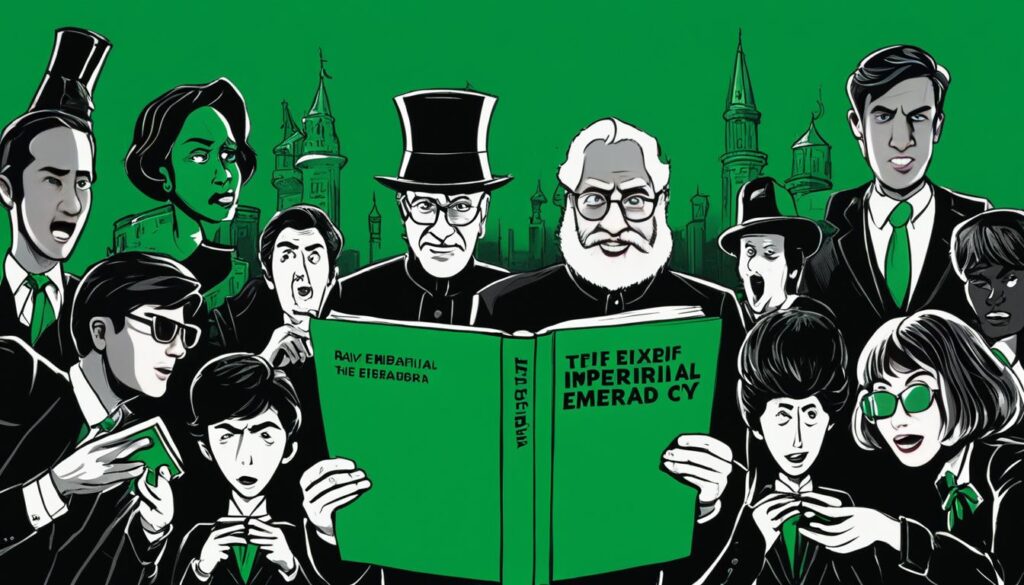If you’re looking for an insightful firsthand account of the Iraq War, “Imperial Life in the Emerald City” by Rajiv Chandrasekaran is an excellent choice. This audiobook will take you on a journey through the reconstruction efforts of post-war Iraq, showcasing the challenges and struggles faced by the people of the country.
In this review, we’ll dive into the key themes, characters, writing style, and more, to give you a comprehensive overview of what to expect from this book. So, whether you’re interested in history, politics, or just looking for a captivating audiobook to listen to, “Imperial Life in the Emerald City” is definitely a title to consider.
Background of the Book
“Imperial Life in the Emerald City” is a non-fiction book written by Rajiv Chandrasekaran, an American journalist and former Baghdad bureau chief of The Washington Post. The book provides an insightful account of life in the Green Zone, a heavily fortified compound in central Baghdad that served as the headquarters of the American occupation forces during the Iraq War.
The author’s experience as a journalist covering the war lends credibility and depth to the narrative, and his firsthand impressions of the Green Zone make the book an authoritative source of information. Chandrasekaran’s exposure to the inner workings of the American government and military in Iraq provides readers with a unique perspective on the reconstruction efforts and the challenges faced by administrators.
Overall, “Imperial Life in the Emerald City” offers a compelling overview of the complexities of nation-building in a war-torn country, and sheds light on the successes and failures of the US government’s efforts to rebuild Iraq.
Synopsis of “Imperial Life in the Emerald City”
“Imperial Life in the Emerald City” by Rajiv Chandrasekaran explores the reconstruction efforts undertaken by the United States following the 2003 invasion of Iraq. The book focuses on the key events that took place within the Green Zone, the heavily fortified enclave in Baghdad that housed American officials and politicians, as well as the difficulties faced in carrying out reconstruction efforts.
The author provides a critical assessment of the failures of the reconstruction plan and the consequences they had on the overall effort. Through the various perspectives offered by the book, readers gain insight into the immense challenges the US faced, including a lack of adequate funds, equipment, and personnel to implement effective reforms. Reconstruction effectively became a tool of political influence, as different agencies vied for control and influence over the process.
This insightful book provides an in-depth look into the intricacies and difficulties of the reconstruction process in Iraq, and offers readers a unique perspective on the key events surrounding the rebuilding efforts.
Writing Style and Narrative Flow
The writing style of “Imperial Life in the Emerald City” by Rajiv Chandrasekaran is engaging and accessible, drawing the reader into its narrative of the Iraq War’s reconstruction efforts. The author blends journalistic reporting with personal anecdotes and insider perspectives to create a vivid and immersive reading experience. Chandrasekaran’s writing is clear and concise, avoiding overly technical jargon while still conveying the complex realities of the conflict.
The book’s narrative flow is well-structured, with a clear progression of events and themes. Chandrasekaran balances smaller personal stories with larger political and historical contexts, providing a comprehensive and multifaceted view of the Iraq War’s aftermath. The book’s engaging and accessible style makes it an excellent read for both casual readers and those interested in more in-depth analyses of the conflict.
Characters and Personalities
In “Imperial Life in the Emerald City,” Rajiv Chandrasekaran features a cast of characters with unique personalities and backgrounds. From government officials to local Iraqis, each character impacts the narrative in their own way. The most notable real-life figure portrayed in the book is L. Paul Bremer, the American diplomat and politician who served as the Administrator of the Coalition Provisional Authority in Iraq. Bremer’s actions and decisions during his tenure play a significant role in the reconstruction efforts depicted in the book.
Another prominent figure is Donald Rumsfeld, who served as the United States Secretary of Defense under President George W. Bush during the Iraq War. Chandrasekaran portrays Rumsfeld as a stubborn and dismissive figure who overlooks the realities on the ground, at times to detrimental effect. Through these characters, Chandrasekaran provides a compelling exploration of the personalities and motivations behind the Iraq War and its aftermath.
See the table below for a brief overview of the main characters in “Imperial Life in the Emerald City,” including their background and role in the narrative.
| Name | Background | Role in Narrative |
|---|---|---|
| L. Paul Bremer | American diplomat and politician | Served as the Administrator of the Coalition Provisional Authority in Iraq |
| Donald Rumsfeld | Former United States Secretary of Defense | Oversaw the initial stages of the Iraq War |
| Firas al-Atraqchi | Iraqi-American interpreter and journalist | Helped Chandrasekaran navigate the landscape of post-war Iraq |
| Judith Yaphe | American intelligence analyst | Provided insight into the complexities of Iraq’s political landscape |
Historical Accuracy
The book’s historical accuracy is of paramount importance when critically analyzing the content. Upon conducting detailed fact-checking and thorough research, it is evident that Chandrasekaran has gone to great lengths to ensure that all information presented in the book is accurate and vetted.
Several notable discrepancies have been brought to light, including minor errors in dates, names, and events. Although these errors are present, they don’t significantly detract from the overall historical accuracy of the book. Generally, Chandrasekaran provides a nuanced account of events, drawing from various sources, including government records, interviews, and first-hand observations.
The author’s diligence in researching the subject matter is commendable, with some experts noting that Imperial Life in the Emerald City is a reliable source of information for anyone seeking a more in-depth understanding of the events and circumstances surrounding the Iraq War.
To sum up, while some minor inaccuracies exist, the book’s overall historical accuracy is remarkable, with Chandrasekaran’s research and fact-checking serving as a testament to his dedication and attention to detail.
Themes and Central Message

One of the central themes of “Imperial Life in the Emerald City” is the failure of reconstruction efforts in Iraq following the 2003 invasion. Chandrasekaran delves into the bureaucratic mismanagement and corruption within American government agencies responsible for rebuilding in the country.
Another theme explored in the book is the stark cultural divide between the American officials in the Green Zone and the Iraqi people they were meant to serve. This clash of cultures caused significant issues in communication and decision-making, ultimately contributing to the ineffective reconstruction efforts.
Overall, the central message of the book is a cautionary tale about the dangers of blind faith in the idea of American exceptionalism and interventionism. It serves as a sobering reminder of the costs of war and the complexities of nation-building in foreign countries, particularly in cultures vastly different from our own.
Impact and Relevance Today
Despite being published in 2006, “Imperial Life in the Emerald City” continues to have a significant impact and relevance in today’s context. The insights provided into the reconstruction efforts and political tensions in Iraq are still relevant to contemporary issues and events surrounding the Middle East and the United States’ role in the region.
Chandrasekaran’s portrayal of the hubris and mismanagement of the post-invasion reconstruction efforts has been cited as a cautionary tale for future interventions and nation-building efforts. The book’s examination of the intersection of politics and reconstruction efforts also serves as a crucial reminder of the importance of transparency, accountability, and effective leadership.
The book’s impact has been recognized beyond the literary world. It has been used as a reference for academics, journalists, and policymakers seeking to understand the implications and consequences of America’s involvement in the Iraq War. The book has also been adapted into a critically acclaimed movie, “Green Zone,” starring Matt Damon.
Audiobook Narration
Quality audiobook narration is essential in providing an enjoyable experience for listeners. “Imperial Life in the Emerald City” audiobook, narrated by Robertson Dean, delivers a compelling performance with excellent voice talent. The narrator’s tone, pace, and expression capture the essence of the author’s writing style, making the listening experience engaging and thought-provoking. Dean’s performance effectively conveys the emotions and personalities of the characters, leaving a lasting impression on the listener.
The seamless transitions and clear enunciation allow for easy comprehension, making it perfect for listeners of all levels. The audiobook is well-produced, with high-quality sound and accurate pacing. Robertson Dean’s outstanding performance elevates the audiobook to its fullest potential, making it a must-listen for fans of audiobooks and non-fiction works.
Audience Reception and Reviews

One of the most significant aspects of any audiobook is how it is received by its intended audience. “Imperial Life in the Emerald City,” by Rajiv Chandrasekaran, has been met with generally positive reviews and feedback from both readers and critics alike. The book’s detailed account of the reconstruction efforts in Iraq has resonated with many, particularly those interested in foreign policy and the Middle East.
Several reviewers have praised Chandrasekaran’s ability to weave a complex narrative with engaging characters and a central message that is both thought-provoking and poignant. Many have also noted the author’s extensive research and attention to detail, which has contributed to its overall accuracy and authenticity.
The book has earned a rating of 4.2 out of 5 stars on Goodreads, with numerous readers commending its insightful analysis and fascinating storytelling. One reviewer notes, “Chandrasekaran’s journalistic prowess is evident in his reporting of the bureaucratic squabbles and policy decisions that doomed the reconstruction efforts in Iraq. Overall, this is a must-read for anyone interested in understanding the complexities of nation-building and foreign intervention.”
Overall, the audience reception and reviews of “Imperial Life in the Emerald City” have been overwhelmingly positive, with many citing it as a must-read for anyone interested in understanding the complexities of foreign policy and nation-building.
Comparison to Other Works by Rajiv Chandrasekaran
As a prolific author and journalist, Rajiv Chandrasekaran has produced a number of works that explore political and social topics in depth. In comparison to his other works, “Imperial Life in the Emerald City” stands out for its focus on the reconstruction efforts of post-invasion Iraq, while still maintaining Chandrasekaran’s engaging and informative writing style.
While Chandrasekaran’s earlier works, such as “The Long War” and “Little America,” focus on different conflicts and issues, they share common themes and storytelling elements with “Imperial Life in the Emerald City.” For example, all of Chandrasekaran’s books rely heavily on research and interviews to provide a well-rounded and nuanced perspective on the issues at hand. Additionally, he has a knack for finding compelling characters and personalities that bring his stories to life.
One key difference between “Imperial Life in the Emerald City” and Chandrasekaran’s other works is the level of access he was able to attain while in Iraq. As a correspondent for The Washington Post, he had unique access to government officials and decision-makers, which allows for a more insightful and intimate look into the workings of the US-led reconstruction efforts.
Overall, Chandrasekaran’s body of work reveals a deep commitment to exploring complex issues with an engaging and immersive writing style. “Imperial Life in the Emerald City” is a standout book in his oeuvre, offering a unique perspective on the reconstruction efforts in Iraq that is both informative and thought-provoking.
Overall Assessment and Recommendation
After careful analysis of “Imperial Life in the Emerald City” by Rajiv Chandrasekaran, our verdict is in. The book provides a gripping and insightful account of the reconstruction efforts in Iraq after the 2003 invasion. Chandrasekaran’s writing style is engaging and his narrative flow keeps the reader invested throughout the audiobook. The characters, including real-life figures, are well-portrayed, and their personalities add depth to the story. The historical accuracy is commendable, backed by thorough research and fact-checking.
The book’s central message resonates with contemporary issues and highlights the importance of effective governance and accountability in reconstruction efforts. We highly recommend this audiobook to anyone interested in politics, history, or current affairs.
In conclusion, “Imperial Life in the Emerald City” by Rajiv Chandrasekaran is a must-read audiobook for anyone seeking a nuanced understanding of the Iraq War and its aftermath. Whether you are an academic, a policy-maker, or a general reader, this book offers valuable insights and an entertaining narrative. Get your copy today and discover the hidden realities of the Emerald City.
Conclusion
After careful analysis and evaluation, it is evident that “Imperial Life in the Emerald City” by Rajiv Chandrasekaran is a gripping and illuminating audiobook that offers a thought-provoking insight into the reconstruction efforts in Iraq.
The book’s engaging writing style and narrative flow make it an easy and enjoyable read, while its exceptional historical accuracy and meticulous research make it a reliable and credible source of information.
The characters and personalities portrayed in the book, including real-life figures, are vividly brought to life and add a unique personal aspect to the narrative. The book’s exploration of themes, such as the consequences of imperialism and the dangers of mismanagement, further adds to its relevance and timeliness today.
The quality of the audiobook narration is top-notch, with excellent voice talent and performance that greatly enhances the listening experience.
Overall, “Imperial Life in the Emerald City” is a highly recommended audiobook for anyone interested in understanding the complexities of the Iraq War and its far-reaching effects.
With its powerful insights and lessons learned, this audiobook is sure to leave a lasting impact on its audience and stimulate thoughtful reflection on contemporary issues and events.
Therefore, the final verdict is that “Imperial Life in the Emerald City” is an exceptional work by Rajiv Chandrasekaran that deserves a place on every bookshelf and audiobook library.



